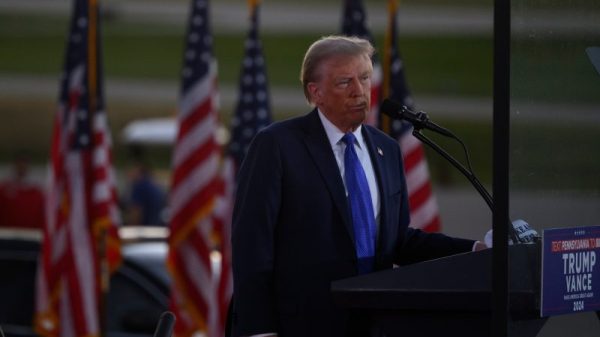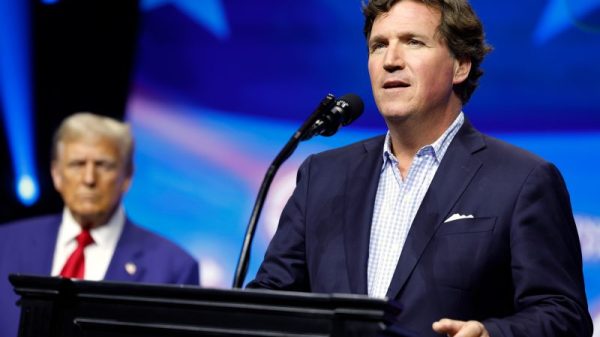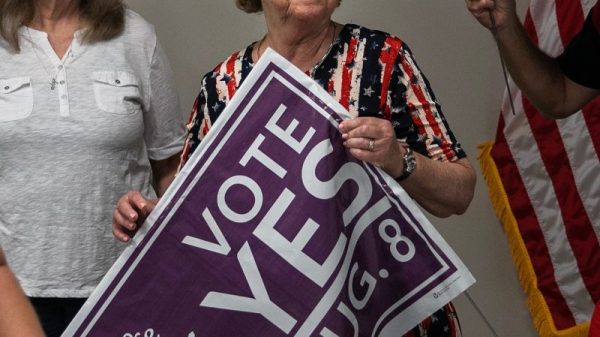Penny Nance slid a form across the table to Donald Trump at his golf club in Bedminster, N.J. Her Christian nonprofit, Concerned Women for America, wanted Trump to pledge in writing that a person’s “gender identity” doesn’t “overrule their sex,” and that if he becomes president again, “all federal agencies will be directed to uphold this fact in every policy and program at home and abroad.”
Such a promise would have wide-ranging implications, the form emphasized, affecting schools, prisons, shelters, health care providers, the military and more. But it was an easy sell, Nance recalled of her June 2023 conversation, and Trump soon signed the pledge. On the trail a few days later Trump marveled aloud at the crowd’s standing ovation for his promise to crack down on “transgender insanity.”
“It’s amazing how strongly people feel about that. You see, I’m talking about cutting taxes, people go like that,” he said, mimicking a polite, reserved clap. “I talk about transgender, everyone goes crazy,” he added. “Who would have thought?”
The former president, who has shifted his position over the years on LGBTQ issues, is planning to lead the GOP charge on gender identity if he returns to the White House, according to his campaign and interviews with allies, testing the legal limits of federal action as the Supreme Court also takes up the issue. He says he wants to kick providers out of Medicare and Medicaid for offering gender transition care to minors such as hormone therapy and surgery; pull federal funding from schools if officials suggest a child “could be trapped in the wrong body”; and purge anything in the federal government deemed to promote transgender identity. The moves would go against the advice of leading medical groups.
He has said far less about gay rights, an issue where he is sometimes out of step with his most conservative Christian supporters. His wife, Melania Trump, has hosted fundraisers for an LGBTQ Republican group in recent months. And over the summer, Trump backed an overhaul of the Republican Party platform that removed long-standing opposition to the Supreme Court ruling that legalized same-sex marriage.
But the first Trump administration fought efforts to extend anti-discrimination laws to cover sexual orientation, and social conservatives are eager for Trump to pick up where he left off. Trump is also expected to try to appoint more conservative judges on the federal bench who could influence future landmark decisions on LGBTQ issues.
Civil rights groups are already raising alarms and preparing to challenge Trump’s agenda in court. A detailed memo the American Civil Liberties Union (ACLU) released in June argues many of Trump’s proposals are illegal or unconstitutional. The group’s lawyers see many opportunities to push back but also say it’s hard to predict how courts might rule, especially after the former president’s success pushing the federal judiciary to the right.
“I think a lot of folks feel if they live in a so-called blue state, they’re safe from whatever impact a second Trump administration can have, and that’s just not true,” said Leslie Cooper, deputy director of the ACLU’s LGBT & HIV Project. The Trump team, she said, is “saying what they would try to do.” She added: “I think we should believe them that they mean it.”
A second Trump term would be a sharp turn away from the Biden administration, which rolled back many Trump-era policies — including Trump’s ban on transgender people serving openly in the military — and is battling in court to require federally funded schools to accommodate transgender students. Vice President Kamala Harris, the Democratic presidential nominee, has also promoted LBGTQ rights as Republican-led states pass laws restricting gender transition care and discussion of LGBTQ issues in schools.
The emerging second-term plans underscore a shift in the politics of LGBTQ issues since 2016, when Trump suggested that North Carolina’s restrictions on transgender people’s restroom use were unnecessary and said the trans celebrity Caitlyn Jenner could use any toilet she wanted at Trump Tower. Republicans who were on the defensive for years on same-sex marriage have turned much of their focus to gender transition and found public support for some restrictions.
Polls show Americans support same-sex marriage by big margins, and a Washington Post-KFF poll last year found that large majorities support laws prohibiting discrimination against transgender people in workplaces, education, the military and other settings.
At the same time, the polls found that about two-thirds of Americans said trans women and girls should not be allowed to play in women’s sports, and solid majorities opposed allowing trans youth to use puberty blockers and hormonal treatments.
Asked how Trump’s administration would approach LGBTQ issues if reelected, Trump campaign spokeswoman Karoline Leavitt said in a statement that Trump’s “second term agenda will create a safer and more prosperous America for ALL Americans, regardless of gender, sexual orientation, race, religion, or creed!”
Trump regularly portrays transgender people as a threat to women in his campaign speeches, mocking their participation in women’s sports before laughing crowds. Last month at a Washington, D.C., summit for the activist group Moms for Liberty, Trump misrepresented the process of gender transition for minors, falsely suggesting schools rather than parents consent to a child’s medical “operation.”
Asked what he could do as president to address the rising number of children identifying as transgender, Trump said: “Well, you can do everything. President has such power.”
Targeting gender transition care
Trump’s plans, if successful, would have enormous impact. Pulling Medicare and Medicaid eligibility for health care providers that offer gender transition care to youth could effectively halt most of that treatment across the country, experts said, building on laws restricting the procedures for minors in more than 20 states.
The Supreme Court said in June that it would review one such law in Tennessee, which would mark the justices’ first chance to weigh whether the restrictions are constitutional.
Ben Carson, who served as Housing Secretary under Trump, said in an interview that he and Trump have talked about what they see as the problem of gender transition care for minors.
“Asking them to make profound decisions that will affect the rest of their lives — those are not reasonable things to do,” he said, referring to treatments that can include hormone therapy and surgery.
Advocates for LGBTQ rights say denying those options is cruel, and note that major medical organizations support the procedures. Some are urging state officials to set aside their own funding for gender-affirming care to blunt potential loss of access under a Trump administration.
“Politicians should prioritize getting the country back on track, not making life more difficult for trans Americans,” said Ash Orr, a spokesperson for the National Center for Transgender Equality. This election, Orr added, will be critical for the trans community.
Some of Trump’s proposals on gender identity — such as a bill banning practices he refers to as “child sexual mutilation” — would require a supportive Congress. Many others would rely on executive action. For example, Trump has promised to reinstate his first administration’s ban on transgender people serving openly in the military.
A quieter fight over gay rights
Trump’s “Agenda 47” videos, which promote his policy plans, dwell on trans issues at length without discussing sexual orientation. But civil rights groups say they anticipate a second Trump term would be consequential for gay rights, as well.
In Trump’s first term, multiple federal agencies quietly removed references to sexual orientation from anti-discrimination guidelines, and the administration argued in court against interpreting discrimination law to cover sexual orientation.
In the summer of 2020, Trump appeared to publicly accept a 6-3 Supreme Court ruling in Bostock v. Clayton County, written by Trump appointee Neil M. Gorsuch, that concluded a federal ban on sex discrimination in employment extends to bias against gay and transgender people. “They’ve ruled, and we live with the decision,” Trump said.
But Trump’s Department of Justice suggested a narrow interpretation of the high court’s ruling, emphasizing potential exceptions for religious views and First Amendment rights and saying in a memo the justices’ interpretation did not necessarily translate to areas besides employment.
Groups such as the ACLU argue that Bostock’s reasoning should apply broadly, and some courts have agreed. But there is pushback. “The debate between conservative constitutionalists and the Biden administration is how Bostock is applied, and the Biden administration has taken Bostock and applied it to everything they could get their hands on,” said Roger Severino, who led the Office of Civil Rights in the Health and Human Services Department under Trump.
More recently, Severino wrote a chapter on health policy for a book published by Project 2025, a conservative effort outside the Trump campaign to recommend personnel and policies for the next administration. (Trump criticized Project 2025 over the summer as Democrats increasingly attacked it.) Severino argues for reversing the Biden administration’s assertion that the Affordable Care Act bans federally-supported health programs from discriminating based on sexual orientation and gender identity.
Some prominent social conservative allies of Trump concede the tides have turned against them on same-sex marriage, which once dominated the political fight over LGBTQ rights. “I don’t know that there’s a policy opportunity on that issue, on marriage,” said Nance of Concerned Women for America, which prominently states on its website that marriage is “between a man and a woman.”
Trump criticized the Supreme Court’s Obergefell ruling legalizing same-sex marriage nationwide during the GOP primary in 2016, then said shortly after winning the election that he was “fine” with it.
Still, the 2022 Supreme Court ruling striking down the long-standing right to abortion — and conservative Justice Clarence Thomas’s suggestion at the same time that gay rights cases need reexamining — has made the LGBTQ community nervous that other precedents could fall, especially if Trump makes more judicial appointments.
Charles Moran, the president of the Log Cabin Republicans — a group for LGBTQ conservatives and their allies — said Trump has been supportive, praised his first administration’s efforts to decriminalize homosexuality internationally and noted that Trump had the first Pride Coalition in GOP presidential campaign history.
But other Trump supporters have resisted the growing acceptance of same-sex marriage. Severino’s chapter in the Project 2025 policy book encourages the next Health and Human Services secretary to endorse the idea that “married men and women are the ideal, natural family structure.” Asked about that idea, Moran echoed Trump and his advisers’ distancing from Project 2025.
“Kids sometimes write letters to Santa Claus with their wish list of things that they’d like,” Moran said. Some adults “do exactly the same thing,” he added.





























